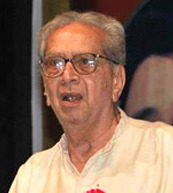|
Shriram Lagoo
Dr. Shriram Lagoo (16 November 1927 – 17 December 2019) was an Indian film and theatre actor, in Hindi and Marathi, in addition to being an ENT Surgeon. He was known for his character roles in films. He acted in over 250 films including Hindi and Marathi films as well as Hindi, Marathi and Gujarati plays, and directed over 20 Marathi plays. He was also very vocal and active in furthering progressive and rational social causes, for example in 1999, he and social activist G. P. Pradhan undertook a fast in support of anti-corruption crusader Anna Hazare.[1] He won the 1978 Filmfare Award for Best Supporting Actor for the Hindi film Gharaonda. His autobiography is titled Lamaan (लमाण), which means "the carrier of goods".[2][3] Early lifeShreeram Lagoo was born in Satara district, Maharashtra, India to Balakrishna Chintaman Lagoo and Satyabhama Lagoo, and was the eldest of four children. He attended Bhave High School, Fergusson College (University of Pune) and B. J. Medical College (University of Pune), India and received MBBS & MS degrees-both medical degrees.[4] Career
Shreeram Lagoo started acting in plays while attending Medical College. Once bitten by theatre bug, he continued his dramatic activity through a group "Progressive Dramatic Association", which he started with like-minded senior friends like Bhalba Kelkar.[5] Meanwhile, he received a degree in ENT Surgery from University of Mumbai in the early fifties and practised in Pune for six years before going to Canada and England for additional training.[6] He practised medicine and surgery in Pune, India and Tabora, Tanzania in the sixties,[citation needed] but his theatre activity through Progressive Dramatic Association in Pune and "Rangaayan" in Mumbai continued when he was in India. Finally, in 1969 he became a full-time actor on Marathi stage, debuting in the play Ithe Oshalala Mrityu, written by Vasant Kanetkar.[citation needed] Lagoo finally started working as a full-time drama actor in the year 1969, from Vasant Kanetkar's play "Where Death Shied Away".[citation needed] He played a leading role in the play 'Natsamrat' written by Kusumagraj (Vishnu Vaman Shirwadkar) and was best remembered for that role. He had a legendary status in Marathi cinema[citation needed], where he did many memorable movies which included successes like Sinhasan, Pinjra and Mukta. His wife, Deepa Lagoo, is also a noted theatre, TV, and film actress.[7] He had two sons and a daughter. Lagoo also instituted the prestigious Tanveer Samman, given to most promising stalwart in theatre industry of India, in the memory of his son Tanveer Lagoo.[citation needed] Some of his best[citation needed] performances in Hindi films were when he was pitted with Rajesh Khanna in films like Thodisi Bewafai, Maqsad, Souten, Nasihat, Awam. His other best performances came in films like Devata, Des Pardes, Lawaris, Muqaddar Ka Sikander, Inkaar, Sajan Bin Suhagan, Kinara, Lootmaar, Sau Crore, Jyoti Bane Jwala, Neeyat, Nishana, Swayamvar, Shriman Shrimati, and Sadma.[citation needed] FilmographyMarathi movies
Marathi plays
Hindi movies
Awards and recognition
Religious beliefs
Shriram was a known non-religious rationalist.[citation needed] Once after being conferred with an award called Punyabhushan (Pride of Pune) on behalf of the organization called Tridal, he was interviewed by Sudhir Gadgil. When asked about Jabbar Patel's play, wherein Lagoo had to stand before Lord Vitthal, "Did you stand there as a devotee or only as per the demand of the script?" Lagoo replied "I stood there as if I was standing in front of a stone idol that is known as Panduranga".[12] He has written an article titled "Time to Retire God", which provoked hot discussions in the print media and other public platforms in India. This article was written as an introduction to a book on Abraham Kovoor. In this article, Lagoo logically came to the conclusion that the concept of God is defunct. He was actively associated with the anti-superstition movement in Maharashtra. He used to call God as another superstition and his lectures during the ANS programs used to go like this:[13]
References
External links |
||||||||||||||||||||||||
